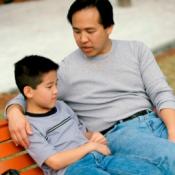 During healthy development, children learn that the people around them are mostly safe and trustworthy. Even when they do not get what they want, they eventually learn to self-soothe in many ways as they grow. They may try persuasion or defiance to get what they want or avoid what they do not want, but ultimately they learn that being respectful and cooperative maintains stability. Because the average child’s brain is not easily triggered to extremes, they typically find ways to self-soothe, delay gratification, and self-regulate their emotions.
During healthy development, children learn that the people around them are mostly safe and trustworthy. Even when they do not get what they want, they eventually learn to self-soothe in many ways as they grow. They may try persuasion or defiance to get what they want or avoid what they do not want, but ultimately they learn that being respectful and cooperative maintains stability. Because the average child’s brain is not easily triggered to extremes, they typically find ways to self-soothe, delay gratification, and self-regulate their emotions.
Either due to traumatic experiences—including abuse or extreme neglect—or developmental anomalies, some kids have intense fight, flight, or freeze responses and little ability to self-soothe. Chronic volatility in family relationships can also set this pattern into motion. Developmental neurobiologist Daniel Siegel (2003) wrote, “The mind develops as the brain responds to ongoing experience.” Problem behavior is a manifestation of well-worn neural and cognitive pathways that translate into reflexive emotional, cognitive, and behavior patterns.
We must learn to detour kids’ domino-effect reactions, which so frequently emanate from underlying fear or shame. Matthew Selekman (1993) wrote that change arises “out of the breaking of patterns, both of thought and action, the interruption of repeating sequences.” Many adults perpetuate volatile cycles of emotion, thought, and behavior unintentionally by interacting with children in ways that trigger further volatility.
Navigating out of these ruts requires self-control, empathy, and creativity. Explosive and withdrawn behaviors are typically adaptive responses, arising out of needs to be liked, valued, and respected, needs to have some sense of predictability and control, needs to heighten or lessen sensory stimulation, or all of the above. When behaviors are confronted through criticism or control, a defensive neurophysiological response perpetuates the vicious cycle through an emotional display on the outside of feelings being felt on the inside.
Development is a train choo-choo-ing along. When the Polar Express slid out of control on a lake of ice, it took courage, creativity, and collaboration to aim it back onto its tracks. It is important to maintain firm guidance alongside unconditional acceptance, as well as to discern that fine line between what is vital and what is negotiable. Consequently, the need to become defensive and act out may diminish over time if the child finds that it is not needed anymore to be heard or to feel loved.
I describe therapeutic connection in the acronym ATM, in which “A” stands for accommodation, “T” for tracking, and “M” for mirroring. We maximize opportunities for connection when we accommodate our use of words to those used by another, track and intentionally relate with the stories they tell, and mirror body language to the extent that it sends the message, “There is no need for defense. I’m here with you, and I care about you. I’m trying the best I can to know you.” This is part of the way we invest into the relationship account, and when the time comes for withdrawal, those who have done so won’t go for broke.
It is important to maintain firm guidance alongside unconditional acceptance, as well as to discern that fine line between what is vital and what is negotiable.
Children who are withdrawn often need greater affirmation of their strengths and efforts. Mark Twain once wrote, “I can live for two months on a good compliment.” When someone approves of some part of who we are, it is as if that part of us becomes illumined. The need for approval can be compulsive, but just about anything can be. The truth is that we benefit from that sort of love in our lives. We grow better in the light.
Discipline should aim to teach and to train a child. We must not fail to teach facts and skills, for they are pixels in the resolution of a bigger picture. Yet, insight also has its limitations. I believe that there are few better ways to teach or train a child than to immerse him or her in the best experiences that life has to offer: fun, silliness, art, creativity, exercise, work, rest, food, adventure, and relationship—not necessarily in that order. I call these the parenting disciplines. Shared moments equal shared lives.
Children who are explosive may engage easily in power struggles. Before getting hooked in, learn the patterns and try to better anticipate them. Proactively communicate about expectations, limits, and consequences so that they are clear, measurable, and enforceable. When a power struggle is beginning, verbalize guidance authoritatively, then stop talking, and maybe even walk away. Become a broken record, if need be, in reinforcing limits. Play good cop/bad cop, and let established rules and limits do the dirty work.
If you accidentally get stuck in a power struggle, catch yourself, confess it, and end it: “Ah, you hooked me, and I just realized it.” It’s OK to change your mind. It’s also OK to be honest about your own internal ambivalence about a decision, yet to be firm in it. We need not hide these tricks up our sleeves.
Also, be sure that you understand the difference between perpetual tugs-of-war and constructive complaints or requests from your child. Be open to negotiating or changing your mind when there is opportunity to be flexible. Diplomacy and adaptability are fundamental life skills for all of us, skills that are gained via modeling and experience, and we would do well to pass them along to our children.
More than anything, it is important to remain calm and cool-headed when facing difficult behavior. The best strategy is to “seek first to understand and then to be understood.” When people are angry, resistant, and anxious, feeling that someone is attempting to hear and understand them can be calming and helpful.
Many children carry with them legitimate anger, fear, sadness, and shame related to predispositions, situations, and experiences largely out of their control. They need someone to love them in spite of ways they reflexively aggress or distance as they negotiate through ambivalent inclinations. At the end of the day, every child wants to be heard, which is just another way of saying understood, and loved, which is just another way of saying known.
There is a child in your life secretly hoping you will hear and love him or her today. Will you?
References:
- Selekman, M. (1993). Pathways to change: Brief therapy solutions with difficult adolescents. New York: The Guilford Press.
- Hartzell, M., & Siegel, D. (2003). Parenting from the inside out. New York, NY: Tarcher/Penguin.

The preceding article was solely written by the author named above. Any views and opinions expressed are not necessarily shared by GoodTherapy.org. Questions or concerns about the preceding article can be directed to the author or posted as a comment below.

 Parenting with Discipline: What Type of Parent Are You?
Parenting with Discipline: What Type of Parent Are You? Punishments vs. Consequences: Teach Your Teen the Difference
Punishments vs. Consequences: Teach Your Teen the Difference With Loving Eyes: Fostering Your Child’s Positive Body Image
With Loving Eyes: Fostering Your Child’s Positive Body Image

Please fill out all required fields to submit your message.
Invalid Email Address.
Please confirm that you are human.
Leave a Comment
By commenting you acknowledge acceptance of GoodTherapy.org's Terms and Conditions of Use.